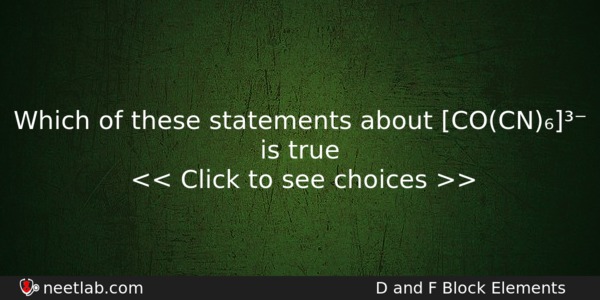| ⇦ | 
| ⇨ |
Which of these statements about [CO(CN)₆]³⁻ is true
Options
(a) [CO(CN)₆]³⁻ has four unpaired electrons and will be in a low-spin configuration
(b) [CO(CN)₆]³⁻ has four unpaired electrons and will be in a high spin configuration
(c) [CO(CN)₆]³⁻has no unpaired electrons and will be in a high-spin configuration
(d) [CO(CN)₆]³⁻ has no unpaired electrons and will be in a low-spin configuration
Correct Answer:
[CO(CN)₆]³⁻ has no unpaired electrons and will be in a low-spin configuration
Explanation:
No explanation available. Be the first to write the explanation for this question by commenting below.
Related Questions: - Standard electrode potential for Sn⁴⁺/Sn²⁺ couple is +0.15 V and that for the
- The number of optical isomers formed by hydrogenation of the compound (CH₃)₂C=CHCH₃
- dsp² hybridisation is found in
- The orthophosphoric acid is a
- Electric configuration of chalcogens in their outermost orbit is
Topics: D and F Block Elements
(91)
Subject: Chemistry
(2512)
Important MCQs Based on Medical Entrance Examinations To Improve Your NEET Score
- Standard electrode potential for Sn⁴⁺/Sn²⁺ couple is +0.15 V and that for the
- The number of optical isomers formed by hydrogenation of the compound (CH₃)₂C=CHCH₃
- dsp² hybridisation is found in
- The orthophosphoric acid is a
- Electric configuration of chalcogens in their outermost orbit is
Topics: D and F Block Elements (91)
Subject: Chemistry (2512)
Important MCQs Based on Medical Entrance Examinations To Improve Your NEET Score
18000+ students are using NEETLab to improve their score. What about you?
Solve Previous Year MCQs, Mock Tests, Topicwise Practice Tests, Identify Weak Topics, Formula Flash cards and much more is available in NEETLab Android App to improve your NEET score.
Share this page with your friends

Leave a Reply